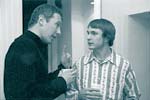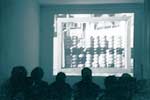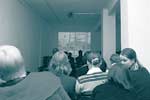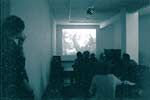 |




MOSCOW DIARY
2002
Mathes Isaac
video: 128 Kbps. fragment
January 03, 2002 at 18:00
A digital video directed by Isaac Mathes, 2001, 46:10, in English and with a live translation into Russian.
The art critic and theorist Walter Benjamin (born in 1892 in Berlin, Germany, died in 1940 on the French/Spanish border) arrived in Moscow in December of 1926. He had three motives for making the trip: to be with Asja Lacis, his lover and comrade-in-arms of two years, to witness first-hand the effects of the Revolution in the Soviet Union and thereby resolve his own position with respect to German Communism and to write an account of Moscow life for a German literary journal. By the time he departed in February of 1927, he had filled one-hundred diary pages with handwritten text. Blending elements of diary, travelogue, art criticism and political analysis, "Moscow Diary" is far and away Benjamin's most personal text. At its core is his detailed account of his passionate and agonizing affair with Lacis (played in the video by Irina Waldron), which he repeatedly characterized as "impossible", while never quite giving up hope, and his heated rivalry with the German theater director and Moscow expatriate Bernhard Reich (played by Georgy Litichevsky), who was Lacis' other life-long companion. For reasons unknown (perhaps to deter overly-curious customs police?) he changed the title of his manuscript from "Moscow Diary" to "Spanish Journey".
The video takes the "love triangle" story as a point of departure, flexibly utilizing documentary and narrative strategies to show how one's contact with a foreign city is first and foremost guided by one's contact with a few people in that city. The camera itself, always handheld, gazing from the more or less alienated position of an outsider, choosing what to reveal and what to hide, plays the role of Benjamin. Deepening this subjective, first-person perspective are sixteen excerpts taken from the "Moscow Diary" text and heard in voiceover on the soundtrack. As Benjamin inwardly triumphs or suffers, his wanderings through the frosty exterior space of the city become more inspired or more desperate. By forging connections between a text written in 1927 and video material shot in 2001, the video sheds light on parallels between Moscow life during the end-of-the-Revolution period and today. Benjamin's meetings with Jewish and Bolshevik literati took place against the ominous background of Stalin's consolidation of power. In the video, his meetings with a host of contemporary artists and intellectuals set in relief the paradoxically ambivalent, critical, enduring and lighthearted stances that Russians are taking towards present abuses of power and the unpredictable future. Ultimately the video reminds us of the fact that, for seventy-five years, Benjamin's observations on Moscow have remained potent and relevant.
Isaac Mathes, born in Massachusetts, is a director, cinematographer and teacher. He currently teaches at the Institute of the Problems of Contemporary Art in Moscow.
Irina Waldron, born in Leningrad, is an artist living and working in Moscow and Paris.
Georgy Litichevsky, born in Dnepropetrovsk, is an artist and art critic living and working in Moscow and Berlin.
is available in Russian (translated by S. Romashko) from Ad Marginem and in English (translated by R. Sieburth) from Harvard University Press.
The site has been created with the assistance of the "Open Society Institute" (Soros Foundation). Russia
|






